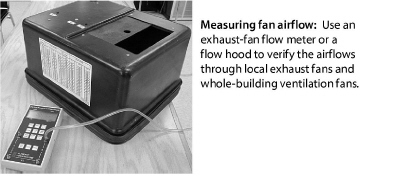
9.2 Whole-Building Ventilation
|
SWS Details: 6.6201.1 Installed System Air Flow |
Most homes in North America currently rely on air leakage for ventilation. The American Society of Heating, Refrigeration, and Air Conditioning Engineers (ASHRAE) publishes ventilation standards. Their current standard, ASHRAE 62.2-2013, requires fan-powered ventilation in all homes, as well as local exhaust ventilation in kitchens and bathrooms. The standard allows for natural infiltration (air leakage) to contribute toward the required whole-building ventilation rate. The standard also allows for whole-building fan-powered ventilation to make up for insufficient local ventilation.
Refer to the standard for more details, guidance, and exceptions that are beyond the scope of this field guide. http://www.techstreet.com/ashrae/products/1855284. Residential Energy Dynamics provides a free online tool to help calculate ASHRAE 62.2-2013 ventilation rates. http://residentialenergydynamics.com
If you air-seal homes during weatherization, you may need to install whole-building mechanical ventilation systems under ASHRAE 62.2–2013, which has 3 components.
• Whole-building ventilation requirement.
• Local ventilation requirement.
• Natural infiltration credit.
9.2.1 Whole-Building Ventilation Requirement
To comply with ASHRAE 62.2–2013, use the Residential Energy Dynamics calculator to determine required air flow. You can provide this fan powered airflow in a number of ways.
• A dedicated exhaust or supply fan running continuously or cycling by automatic control.
• A bathroom or kitchen exhaust fan running continuously or cycling by automatic control.
• A central air handler drawing filtered outdoor air into its return.
• A balanced ventilation system such as a heat-recovery ventilator (HRV) or energy-recovery-ventilator (ERV).
If any room in the house exceeds ±3 pa pressure with reference to the outdoors when all interior doors are closed and while the ventilation system is operating, then install transfer grilles or jumper ducts as needed to reduce the room to outdoors pressure difference to less than ±3 pa. SWS Detail: 6.6201.2 Primary Ventilation Air Flow between Rooms
9.2.2 Local Exhaust Ventilation Requirement
|
SWS Detail: 6.6201.1 Installed System Air Flow, 6.6005.2 Kitchen Range |
There are two options for complying with the ventilation requirements for kitchens and bathroom. Demand controlled exhaust, or continuous exhaust.
• For demand controlled exhaust specify a minimum of 100 CFM for the kitchen, and 50 CFM for each bathroom.
• For continuous exhaust specify a minimum of 20 CFM for each bathroom, and 5 ACH for the kitchen (based on volume).
Local Exhaust Deficit
If the existing kitchen or bathroom ventilation doesn’t meet the requirements in “Local Exhaust Ventilation Requirement” on page 356, you may adjust the whole-building ventilation rate to compensate for the local airflow deficits. Follow these steps to calculate the local-ventilation deficit in CFM that must be added to the whole-building ventilation rate.
1. Determine the total local exhaust ventilation requirement for all kitchens and bathrooms.
2. Measure the delivered airflow of existing kitchen or bathroom exhaust fans using flow hood, flow grid, or other airflow measuring device. Subtract this amount from the total local exhaust ventilation requirement.
3. If the local jurisdiction allows for operable windows to provide for local ventilation, subtract 20 CFM for each kitchen or bathroom that has an operable window.
The result of these steps is the local exhaust ventilation deficit in CFM. Add 1/4 of this deficit to the required whole-building ventilation rate.

ASHRAE 62.2-2013 allows for infiltration to contribute to the building’s ventilation. It is possible that infiltration will meet the entire whole-building ventilation requirement for very leaky buildings. For moderately leaky buildings, infiltration may contribute a portion of the building’s ventilation. The amount of the infiltration credit is determined with a blower door test and weather data based on the building’s location. Calculating the infiltration credit is complicated. To simplify the calculations, use the RED Calc Free online tool at http://www.residentialenergydynamics.com/and select the “Use Local Ventilation Alternative Compliance” option.